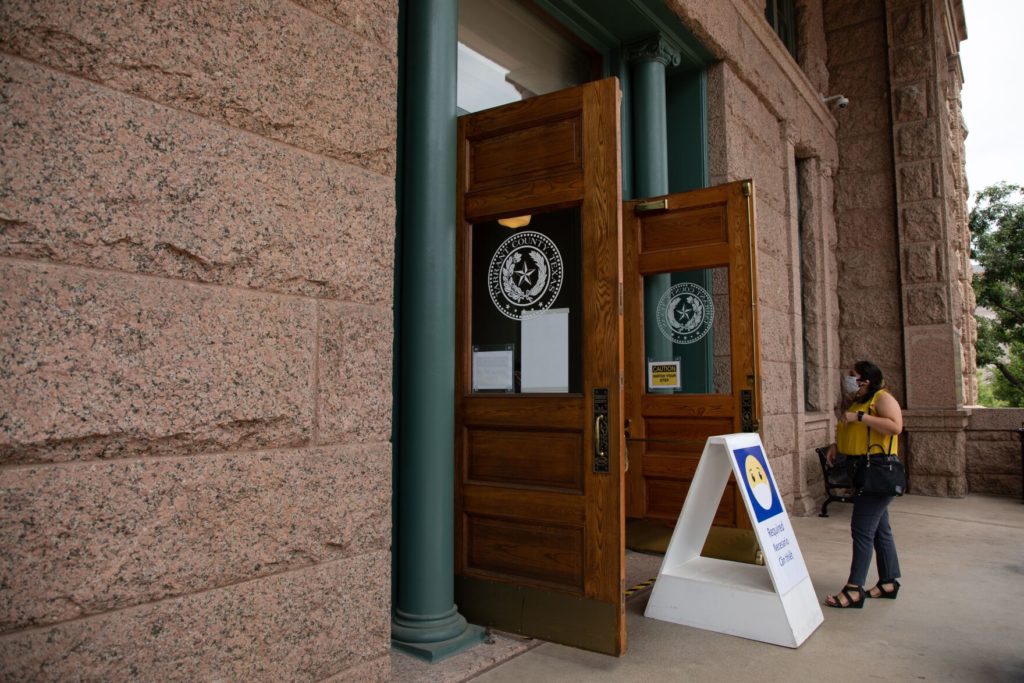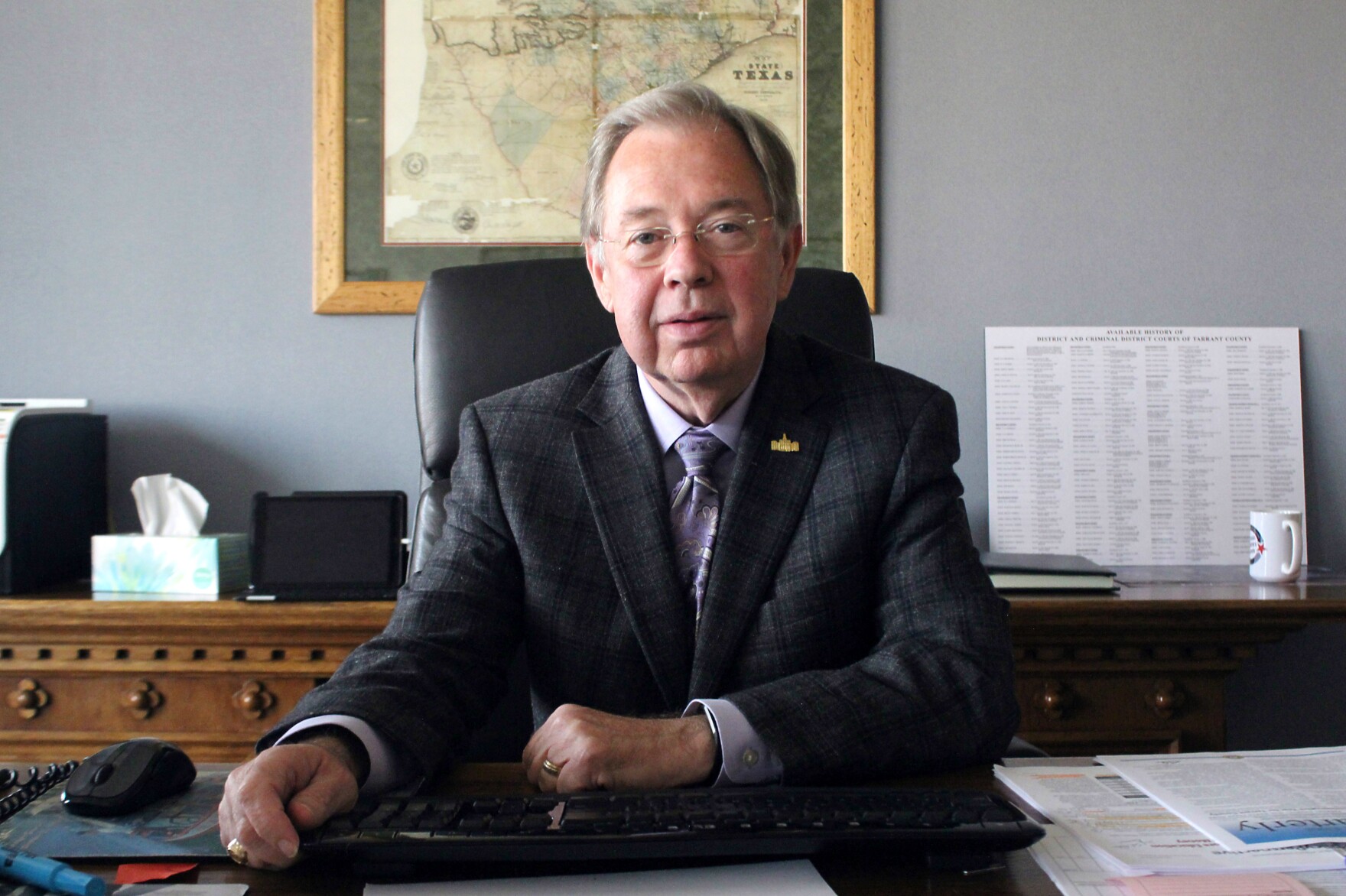From KERA:
Glen Whitley has served as Tarrant County judge for 15 years. He spent most of that tenure feeling pretty obscure.
“Very few people knew or had any clue as to one, what the county judge did. They probably thought they were hearing cases somewhere,” Whitley said. “And two, they had no idea who their county judge was.”
In Texas, county judges are the county’s top elected official. They’re in charge of emergency management, which made them the first line of defense when the coronavirus made its first devastating sweep across the country.
Whitley declared Tarrant County’s public health emergency on March 13, 2020. Later, he’d hand down stay-at-home orders and mandate mask-wearing. The county’s COVID updates became a vital source of news about the progress of the pandemic.
Suddenly, Whitley was not so obscure. His newfound recognition made it into his wife’s annual Christmas letter.
“It’s usually about a page long. In 2020, she had two sentences,” Whitley said. “One, we were fortunate enough to have two grandsons born in 2020. And two, now with the pandemic, everyone now knows not only what their county judge does, but who their county judge is.”
So what is a county judge?
The job of the county judge is enshrined in the Texas state constitution.
County judges preside over the county commissioners court, the governing body of the county. (Think of it like a mayor and a city council, but for a wider area.)
The title of county judge can be misleading, because they don’t always wear robes and dispense justice from the bench. County judges in counties with big populations may not have any judicial duties, but in smaller counties, many work in a traditional courtroom as well as the commissioners court.
Emergency management didn’t used to take up so much of a county judge’s job, said Susan Redford, the executive director of the Texas Association of Counties and a former Ector County judge.
“Now, it’s something they’re dealing with every single day as this pandemic endures,” Redford said. “As opposed to just dealing with a brief hurricane, flood, wildfire that would last a few months, but then it could move on to something else — this has been pervasive for them.”
Counties are sometimes referred to as “forgotten governments,” because they get so much less attention than cities, said J. Edwin Benton, a professor of political science at the University of South Florida who studies counties.
It makes sense that people are paying more attention to their county judges nowadays, Benton said, because the pandemic is an actual issue of life and death.
“We just passed over 900,000 deaths due to COVID just a few weeks ago,” Benton said. “And I think that has ratcheted up concern.”

Masks were required to enter the Tarrant County Courthouse in downtown Fort Worth in this photo taken on July 27, 2020.
Political clashes
The pandemic has been fuel for plenty of political battles. In Texas, cities, counties and the state have gone back and forth in the media and in the courts about how to handle COVID-19.
That kind of fighting isn’t unusual, Benton said.
“I look at the relationship between the state — I call the parent — and local government as children, and the old expression is ‘Children should be seen and not heard,’” he said.
When Republican Gov. Greg Abbott banned local governments from issuing mask mandates, some county officials pushed back. Democratic Dallas County Judge Clay Jenkins challenged Abbott’s order in court.
State government doesn’t know what’s best for locals, Jenkins said last year.
“School districts and government closest to the people should make decisions on how best to keep students and others safe,” he said.
Abbott’s COVID response has led to disagreement within the governor’s own party, too.
Including Whitley, the Tarrant County judge, who’s a Republican.
Whitley hasn’t joined any legal action against the governor, but he said he wished Abbott would let local governments listen to health experts and decide the best course of action for their own counties.
“Folks elect people up and down the ballot,” Whitley said. “They elect them at the national level, at the state level, at the local level. And I often remind the people at the state that they were not geniuses when they voted for them and idiots when they voted for us.”
Whitley cast some of the blame on the tenor of national politics leaking down to the state level — the kind of rhetoric that turned public health matters into political controversies.
“If you if you didn’t wear a mask, you were a Republican, and if you did wear a mask, you were a Democrat,” he said.
Familiar faces on the ballot
Whitley is not running for another term as county judge after 15 years in office. He said he decided not to run again when he last ran for office four years ago, in a pre-COVID world.
Five Republicans and two Democrats are vying to replace him, including some familiar faces. Former Fort Worth mayor Betsy Price and former Farmers Branch mayor Tim O’Hare are on the Republican primary ballot.
Former Tarrant County Democratic Party chair Deborah Peoples is running in the Democratic primary, as well as former Arlington City Council member Marvin Sutton.
Whitley’s advice to his successor: They should remember that they represent the whole county, regardless of political party.
Especially since so many people are watching.
Got a tip? Email Miranda Suarez at msuarez@kera.org. You can follow Miranda on Twitter @MirandaRSuarez.














